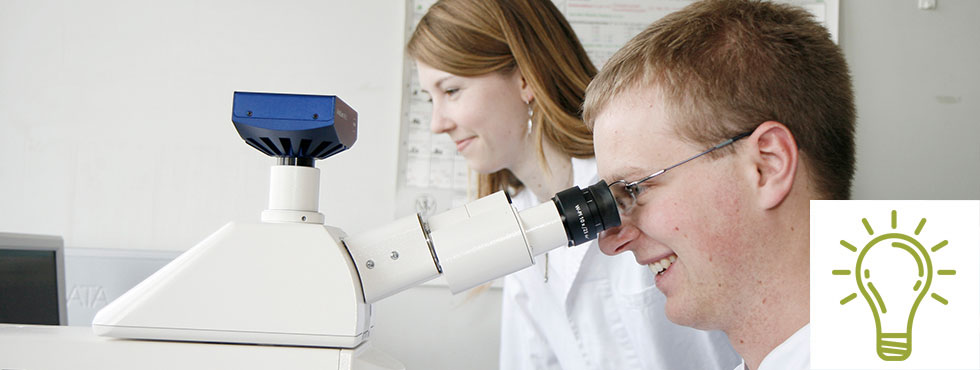The University of Hohenheim’s award-winning project “Humboldt reloaded” enables students to learn through research even during their basic study period. Outside of the regular lectures, they have a chance to work on many different research questions in small teams. In doing so, they go through all stages of a real research project, from preparing the current state of the art to selecting a method for their own research and evaluating and presenting the data. At the end of the project, they prepare an abstract and a scientific poster that they use to present the project at a public, student conference in the Palace.
Why do tadpoles need an Alzheimer’s gene? (in German)
Practice comprises a large part of teaching. Even in the 1st semester there are modules with practical parts. In large groups at first, you will learn the anatomy and systematics of the various classes of animals and plants. The modules for getting to know the departments of biology in the 3rd and 4th semesters are also practically oriented so that you learn the typical scientific working methods of the different areas. These methods are applied in your chosen area of concentration in the 5th and 6th semesters and in the independent Bachelor's thesis. The career-oriented module allows you to gain insight into companies, research institutes, and state institutes outside the university.
Some examples of practical components:
- Regular lab courses starting in the 3rd semester
- Prepare and deliver seminar presentations
- Botanical garden and greenhouses as experimental fields and visual objects for flora and fauna on campus
- Waterfowl excursion to Lake Constance
- Excursion in limnology to different inland waters
- Field trips to terrestrial ecosystems, such as in Cyprus
- Field trips to Mediterranean ecosystems, such as in Croatia
Internships give insights into companies and professional fields. They also help you to understand the context of content in your program, offer orientation, and make it easier to make decisions, e.g. about specializations during your studies. When it comes to the first job after your studies, internships are important as door-openers and accelerate the application process.
There is a difference between a mandatory internship, that is, one that is required in your degree program, and a voluntary internship. In addition, internships can be done abroad. No matter what type of internship it is: it is worth investing the time!
The Internship Office supports all students who want to gain practical experience during their studies.


